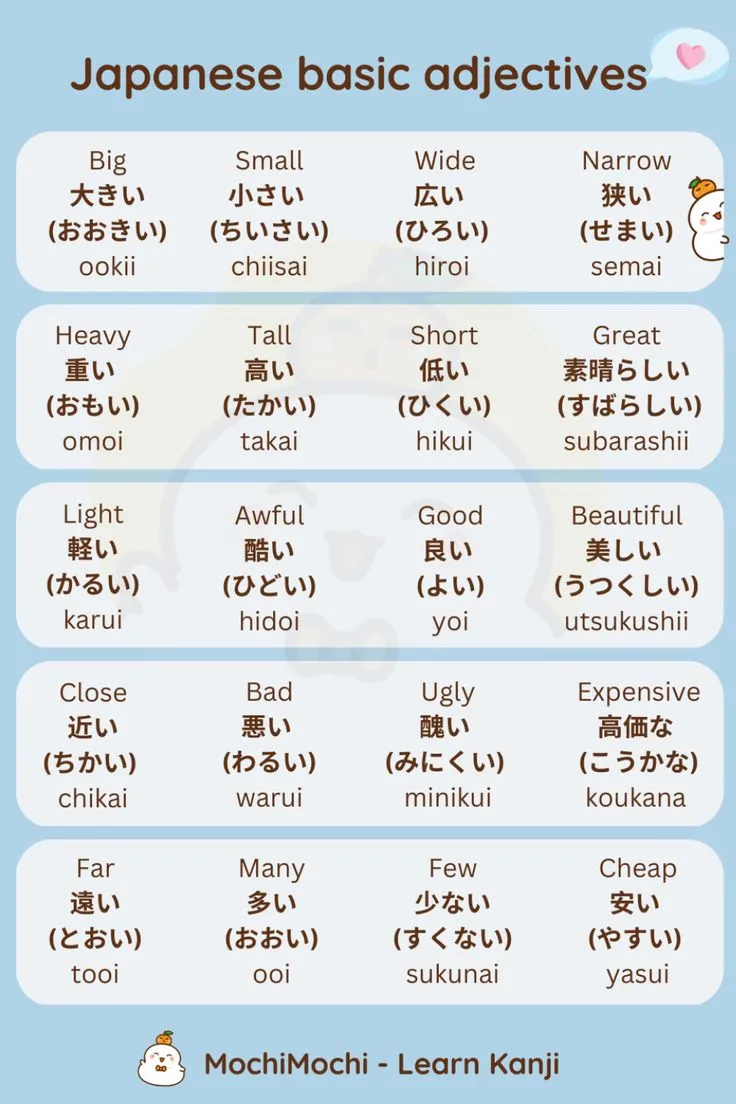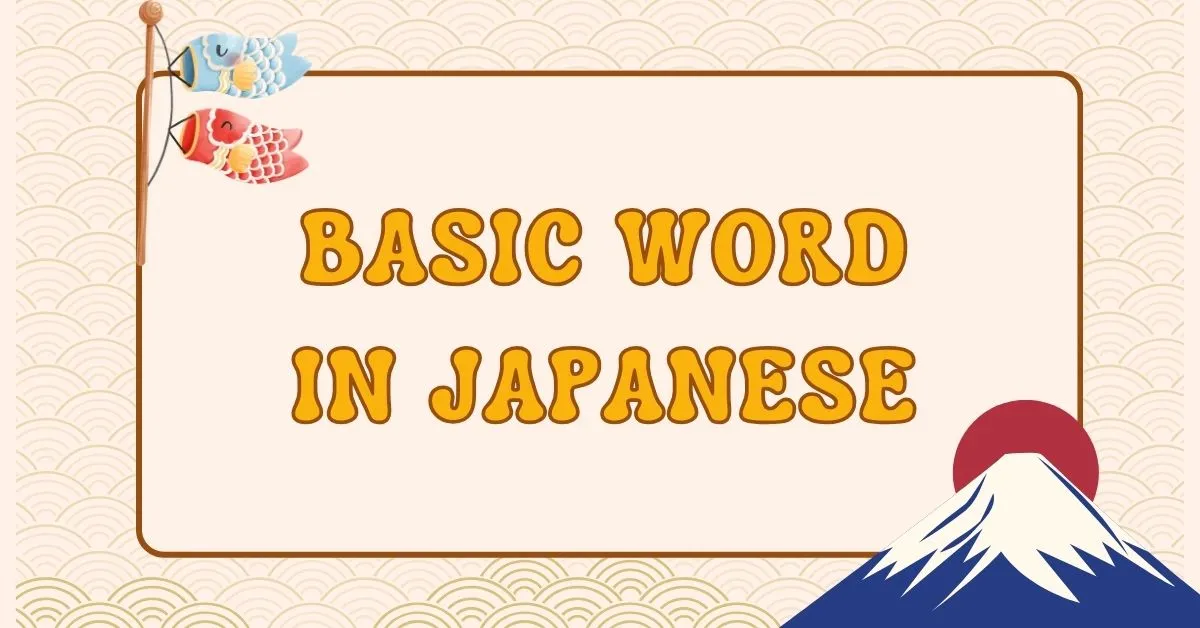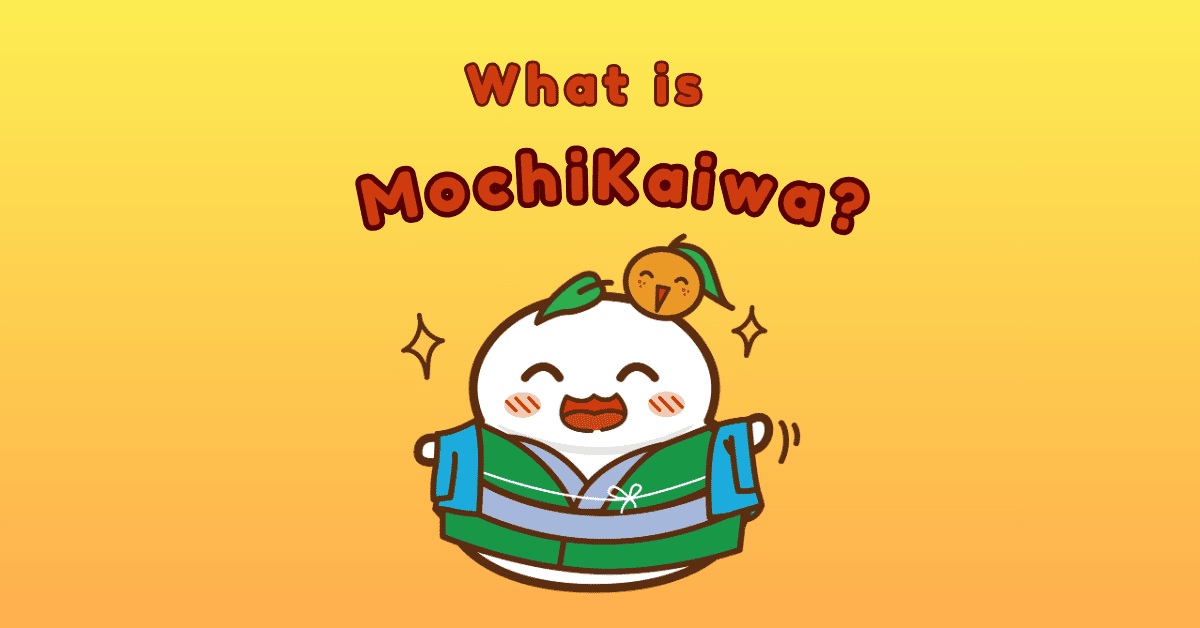When learning Japanese, understanding how to use adjectives is essential for building sentences and expressing yourself clearly. Adjectives in Japanese not only describe nouns but also change form depending on tense and politeness level. In this guide, we’ll cover everything you need to know about adjectives in Japanese, including their types, conjugation, and examples of usage.
- What is an adjective?
- Types of adjectives in Japanese
- How to conjugate adjectives in Japanese
- Using adjectives in Japanese sentences
- Common mistakes with adjectives in Japanese
- 50 common Japanese adjectives
- Learning common adjectives with MochiKanji
- Conclusion

What is Japanese adjective?
An adjective is a word that provides description or detail about a noun, helping to convey more information about people, places, things, or ideas. In Japanese, adjectives play a crucial role in communication, allowing speakers to express feelings, personality traits, and various characteristics like size and color.
Japanese adjectives are diverse and offer a rich range of expressions. Understanding how to use them can significantly enhance your conversational skills.
In terms of structure, Japanese adjectives usually appear before the noun they modify. For instance, you might say 美しい花 (utsukushii hana), which means “beautiful flower.” Alternatively, they can also be used in a sentence structure that combines the noun with a verb, such as 今日は暑いです (kyou wa atsui desu), meaning “Today is hot.”
Most adjectives in Japanese end with the sounds い (i) or な (na), except in their past forms. An adjective consists of a base form, like 美しい (utsukushii), which remains constant, along with a suffix, such as な (na), that can change based on the grammatical context. Learning these rules will provide a solid foundation for effectively using adjectives in your Japanese conversations.
Types of adjectives in Japanese
1. い – Adjectives (i – adjectives)
い – adjectives are easily recognized because they always end with the syllable い in their dictionary form. These adjectives can directly modify nouns and can change depending on the tense and whether the sentence is positive or negative.
Examples:
| Japanese | Romaji | Meaning |
|---|---|---|
| 大きい | ookii | Big |
| 小さい | chiisai | Small |
| 高い | takai | Tall/Expensive |
| 暑い | atsui | Hot (weather) |
| 寒い | samui | Cold (weather) |
| 早い | hayai | Fast |
| 遅い | osoi | Slow |
| 新しい | atarashii | New |
| 古い | furui | Old |
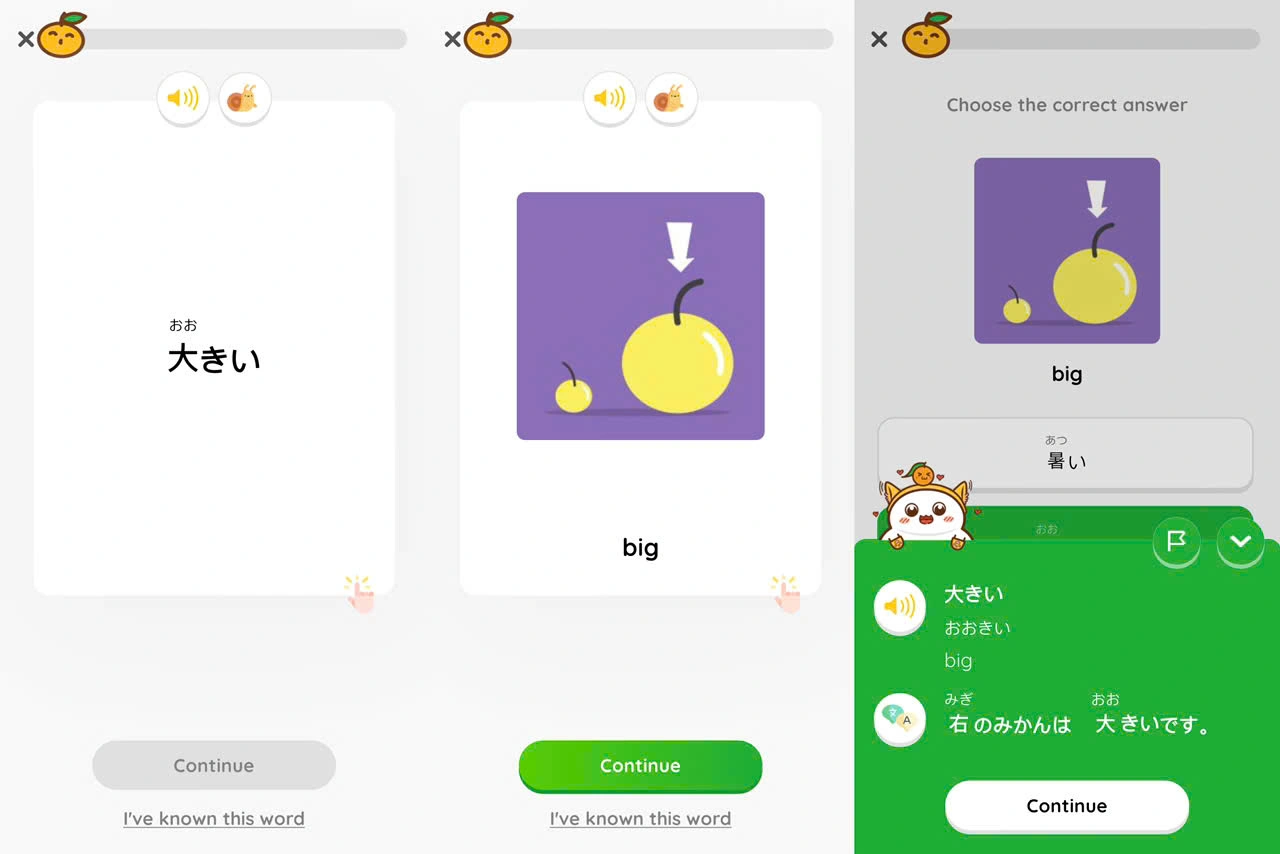
MochiKanji is excellent for learning い – adjectives like “big” (大きい, ookii) through its interactive Flashcards. These flashcards help reinforce your understanding and retention of key adjectives by providing clear definitions, example sentences, and spaced repetition.
2. な – Adjectives (na – adjectives)
な-adjectives require the particle な to modify nouns. They behave more like nouns in their conjugation.
Examples:
| Japanese | Romaji | Meaning |
|---|---|---|
| 静か | shizuka | Quiet |
| 元気 | genki | Energetic |
| 有名 | yuumei | Famous |
| 便利 | benri | Convenient |
| 親切 | shinsetsu | Kind |
| 簡単 | kantan | Simple |
| 綺麗 | kirei | Beautiful |
How to conjugate adjectives in Japanese
1. Conjugating い-Adjectives
い-Adjectives follow a clear pattern for conjugation depending on tense and whether the sentence is positive or negative.
| Tense | Form | Example Sentence | Meaning |
|---|---|---|---|
| Present Positive | [Adjective] | このリンゴは大きいです。(Kono ringo wa ookii desu.) | This apple is big. |
| Present Negative | [Adjective] -くない | このリンゴは大きくないです。(Kono ringo wa ookikunai desu.) | This apple is not big. |
| Past Positive | [Adjective] -かった | このリンゴは大きかったです。(Kono ringo wa ookikatta desu.) | This apple was big. |
| Past Negative | [Adjective] -くなかった | このリンゴは大きくなかったです。(Kono ringo wa ookikunakatta desu.) | This apple was not big. |
2. Conjugating な – Adjectives
Unlike い-adjectives, な-adjectives require “です” for polite speech and follow a slightly different pattern for conjugation.
| Tense | Form | Example Sentence | Meaning |
|---|---|---|---|
| Present Positive | [Adjective] + です | この部屋は静かです。(Kono heya wa shizuka desu.) | This room is quiet. |
| Present Negative | [Adjective] + ではない/じゃない | この部屋は静かじゃないです。(Kono heya wa shizuka janai desu.) | This room is not quiet. |
| Past Positive | [Adjective] + でした | この部屋は静かでした。(Kono heya wa shizuka deshita.) | This room was quiet. |
| Past Negative | [Adjective] + じゃなかった / ではなかった | この部屋は静かじゃなかったです。(Kono heya wa shizuka janakatta desu.) | This room was not quiet. |
Using adjectives in Japanese sentences
Adjectives in Japanese typically come before the noun they modify. They help provide detailed descriptions and add depth to sentences.
Examples:
- い – Adjective: 暑い日です (atsui hi desu) – It is a hot day.
- な – Adjective: 静かな部屋です (shizukana heya desu) – It is a quiet room.
In casual speech, the です (desu) ending may be dropped for a more informal tone:
- 暑い! (Atsui!) – It’s hot!
- 静かだね。 (Shizuka da ne.) – It’s quiet, isn’t it?
Common mistakes with adjectives in Japanese
Here are a few common mistakes learners might make with Japanese adjectives:
- Mixing い and な adjectives: Ensure you use い for い – adjectives and な for な – adjectives when modifying nouns.
- Forgetting conjugation: Always conjugate adjectives correctly to reflect tense and negation.
- Dropping the な for な – adjectives: Always use な before nouns when using な – adjectives.
50 common Japanese adjectives
| Japanese | Romaji | Meaning | Example | English translation |
| 高い | takai | High/Tall | このビルは高いです。(Kono biru wa takai desu.) | This building is tall. |
| 低い | hikui | Low/Short | この机は低いです。(Kono tsukue wa hikui desu.) | This desk is low. |
| 小さい | chiisai | Small | 小さい猫がいます。(Chiisai neko ga imasu.) | There is a small cat. |
| 長い | nagai | Long | 長い髪の女性。(Nagai kami no josei.) | A woman with long hair. |
| 短い | mijikai | Short | 短いズボンを履いています。(Mijikai zubon o haiteimasu.) | Wearing short pants. |
| 新しい | atarashii | New | 新しい車を買いました。(Atarashii kuruma o kaimashita.) | I bought a new car. |
| 古い | furui | Old | 古い本を見つけました。(Furui hon o mitsukemashita.) | I found an old book. |
| 醜い | minikui | Ugly | 醜い建物はありません。(Minikui tatemono wa arimasen.) | There are no ugly buildings. |
| 難しい | muzukashii | Difficult | この問題は難しいです。(Kono mondai wa muzukashii desu.) | This problem is difficult. |
| 簡単 | kantan | Easy | 簡単なレシピです。(Kantan na reshipi desu.) | It’s an easy recipe. |
| 速い | hayai | Fast | 速い車が好きです。(Hayai kuruma ga sukidesu.) | I like fast cars. |
| 遅い | osoi | Slow | このパソコンは遅いです。(Kono pasokon wa osoi desu.) | This computer is slow. |
| 暑い | atsui | Hot | 今日は暑いですね。(Kyou wa atsui desu ne.) | It’s hot today, isn’t it? |
| 寒い | samui | Cold | 寒い日は苦手です。(Samui hi wa nigate desu.) | I dislike cold days. |
| 短い | mijikai | Short | 短い話をしましょう。(Mijikai hanashi o shimashou.) | Let’s have a short talk. |
| 強い | tsuyoi | Strong | 彼はとても強いです。(Kare wa totemo tsuyoi desu.) | He is very strong. |
| 弱い | yowai | Weak | このチェーンは弱いです。(Kono cheen wa yowai desu.) | This chain is weak. |
| 早い | hayai | Early | 早く起きました。(Hayaku okimashita.) | I woke up early. |
| 安い | yasui | Cheap | この店は安いです。(Kono mise wa yasui desu.) | This store is cheap. |
| 高い | takai | Expensive | そのバッグは高いです。(Sono baggu wa takai desu.) | That bag is expensive. |
| 幸せ | shiawase | Happy | 幸せな気持ちです。(Shiawase na kimochi desu.) | It’s a happy feeling. |
| 悲しい | kanashii | Sad | 映画はとても悲しいです。(Eiga wa totemo kanashii desu.) | The movie is very sad. |
| おいしい | oishii | Delicious | この料理はおいしいです。(Kono ryouri wa oishii desu.) | This food is delicious. |
| まずい | mazui | Unappetizing | このスープはまずいです。(Kono suupu wa mazui desu.) | This soup is unappetizing. |
| うるさい | urusai | Noisy | この部屋はうるさいです。(Kono heya wa urusai desu.) | This room is noisy. |
| 静か | shizuka | Quiet | 静かな場所を探しています。(Shizuka na basho o sagashiteimasu.) | I am looking for a quiet place. |
| 素晴らしい | subarashii | Wonderful | 素晴らしい景色ですね。(Subarashii keshiki desu ne.) | What a wonderful view. |
| つまらない | tsumaranai | Boring | この映画はつまらないです。(Kono eiga wa tsumaranai desu.) | This movie is boring. |
| 正しい | tadashii | Correct | 正しい答えを教えてください。(Tadashii kotae o oshiete kudasai.) | Please tell me the correct answer. |
| 間違い | machigai | Incorrect | 間違いがあります。(Machigai ga arimasu.) | There is an error. |
| 便利 | benri | Convenient | このアプリは便利です。(Kono apuri wa benri desu.) | This app is convenient. |
| 不便 | fuben | Inconvenient | その場所は不便です。(Sono basho wa fuben desu.) | That place is inconvenient. |
| きれい | kirei | Beautiful/Clean | きれいな部屋ですね。(Kirei na heya desu ne.) | It’s a beautiful/clean room. |
| 汚い | kitanai | Dirty | この部屋は汚いです。(Kono heya wa kitanai desu.) | This room is dirty. |
| 明るい | akarui | Bright | 部屋はとても明るいです。(Heya wa totemo akarui desu.) | The room is very bright. |
| 暗い | kurai | Dark | 部屋は暗いです。(Heya wa kurai desu.) | The room is dark. |
| 熱い | atsui | Hot (to the touch) | このお茶は熱いです。(Kono ocha wa atsui desu.) | This tea is hot. |
| 冷たい | tsumetai | Cold (to the touch) | 冷たい水を飲みました。(Tsumetai mizu o nomimashita.) | I drank cold water. |
| 賢い | kashikoi | Smart | 彼女は賢いです。(Kanojo wa kashikoi desu.) | She is smart. |
| 愚かな | oroka | Foolish | 愚かなことを言わないでください。(Orokana koto o iwanaide kudasai.) | Please don’t say foolish things. |
| 親切 | shinsetsu | Kind | 親切な先生です。(Shinsetsu na sensei desu.) | He is a kind teacher. |
| 冷静 | reisei | Calm | 冷静な対応が必要です。(Reisei na taiou ga hitsuyou desu.) | A calm response is necessary. |
| 速い | hayai | Quick | 速いレスポンスですね。(Hayai resuponsu desu ne.) | That’s a quick response. |
| 遅い | osoi | Slow | この手続きは遅いです。(Kono tetsuzuki wa osoi desu.) | This procedure is slow. |
| 楽しい | tanoshii | Fun | このイベントは楽しいです。(Kono ibento wa tanoshii desu.) | This event is fun. |
| 退屈 | taikutsu | Boring | この授業は退屈です。(Kono jugyou wa taikutsu desu.) | This class is boring. |
| 結構 | kekkou | Quite | 結構おいしいですね。(Kekkou oishii desu ne.) | It’s quite tasty. |
Learning common adjectives with MochiKanji
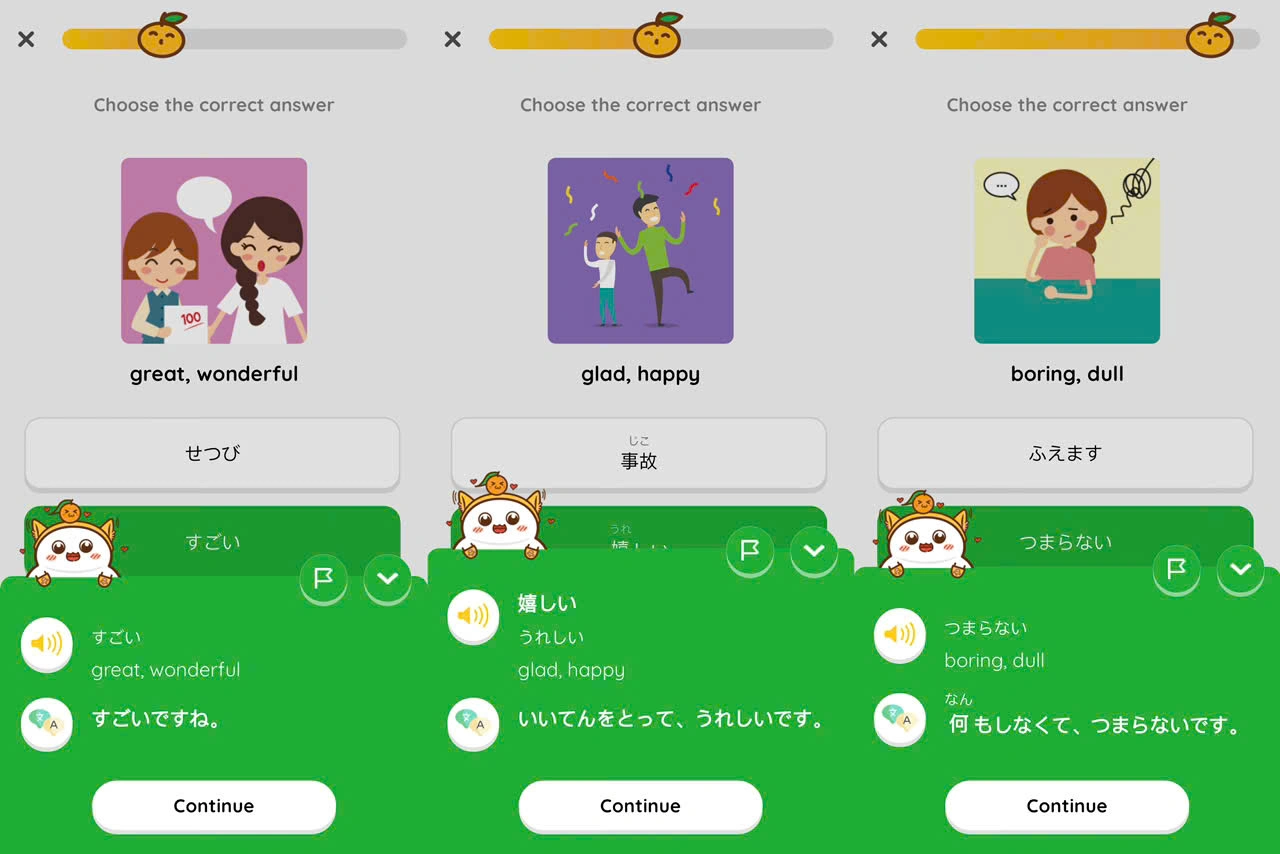
Mastering Japanese adjectives can be challenging, but MochiKanji simplifies the process significantly. This app employs flashcards for effective memorization of both い – adjectives and な – adjectives, ensuring you retain vocabulary over time. With its Golden Time feature, you can optimize your study sessions by focusing on the most relevant words when you’re most alert. Additionally, MochiKanji’s engaging study methods allow you to practice conjugation and usage in an enjoyable, interactive way.
Start your free trial now!
Conclusion
Mastering adjectives in Japanese is crucial for enhancing your language skills. By understanding the difference between い – adjectives and な – adjectives, as well as how to conjugate them, you’ll be able to describe people, places, and things with ease. With practice, you’ll find that adjectives help bring more depth and expression to your Japanese conversations.
FAQs
What is an example of a Japanese adjective?
An example of a Japanese adjective is “takai” (高い), which means “high” or “expensive.” It’s an i-adjective, one of the two main types of adjectives in Japanese. Other examples of i-adjectives include “atsui” (暑い), meaning “hot,” and “samui” (寒い), meaning “cold.”
How many adjectives do Japanese have?
Japanese has two main types of adjectives: i-adjectives and na-adjectives. While it’s hard to put an exact number on how many adjectives exist in Japanese, there are thousands of them, many of which can describe physical attributes, emotions, or states of being. The key difference between i-adjectives and na-adjectives is how they are conjugated and used in sentences.
How do you use na-adjectives in Japanese?
Na-adjectives are used differently from i-adjectives in that they require the particle “na” when they directly modify a noun. For example, if you want to say “a beautiful flower,” you would say “kirei na hana” (きれいな花). The adjective “kirei” (beautiful) is a na-adjective, and you need the “na” particle to connect it to the noun “hana” (flower). When using na-adjectives at the end of a sentence or before a verb, you don’t need the “na” particle, for example: “Kirei desu” (きれいです) meaning “It is beautiful.”
What is the adjective II in Japanese?
The term “adjective II” (also known as “adjective type II”) refers to a historical categorization of adjectives in older forms of Japanese grammar. In modern usage, adjectives are mainly classified into i-adjectives and na-adjectives, so the term “adjective II” isn’t commonly used in contemporary grammar. However, in some cases, “adjective II” can refer to adjectives that end in “-i”, as they conjugate with the “i” ending (like “takai,” “atsui,” etc.). It’s an older grammatical term, so you’re more likely to encounter i-adjectives and na-adjectives in standard textbooks.

